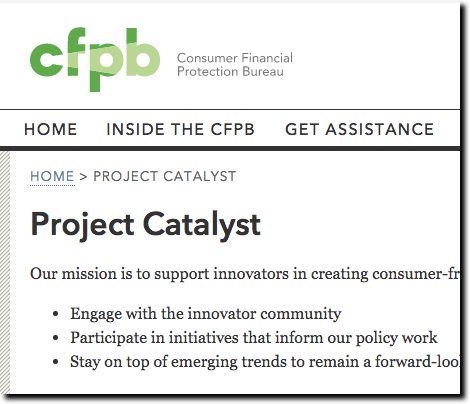___________________________________
Guest post by Erica A.N. Kramer and Justin B. Hosie*
______________________________________
On February 18, the Consumer Financial Protection Bureau (CFPB) released the final version of its Policy on No-Action Letters. The policy is part of the CFPB’s Project Catalyst Initiative whose stated mission is to “support innovators in creating consumer-friendly financial produ cts and services.” The new policy is designed to further the initiative’s mission by allowing developers of new consumer financial services to submit a request to the CFPB for a “No-Action Letter” regarding their innovation’s regulatory compliance.
cts and services.” The new policy is designed to further the initiative’s mission by allowing developers of new consumer financial services to submit a request to the CFPB for a “No-Action Letter” regarding their innovation’s regulatory compliance.
The most important feature of the No-Action Letter is that it will include a statement indicating that “[CFPB] staff has no present intention to recommend initiation of an enforcement or supervisory action against the requester in respect to the particular aspects of its product under the specific identified provisions and applications of statutes or regulations that are the subject of the [No-Action Letter].” In other words, a No-Action Letter provides an innovator with a green light indicating that the proposed product or service does not conflict with cited statutes or regulations.
 In fact, the Supplementary Information included with the policy goes so far as to indicate that CFPB staff would not recommend an enforcement or supervisory action against the holder of a No-Action Letter, absent new or extraordinary circumstances. To borrow from MasterCard’s commercials, the value of a regulatory green light from the CFPB in today’s environment is “Priceless.”
In fact, the Supplementary Information included with the policy goes so far as to indicate that CFPB staff would not recommend an enforcement or supervisory action against the holder of a No-Action Letter, absent new or extraordinary circumstances. To borrow from MasterCard’s commercials, the value of a regulatory green light from the CFPB in today’s environment is “Priceless.”
In addition to the No-Action Letter itself, the CFPB believes the new policy encourages informal preliminary discussions. This presents a unique opportunity to participate in an open dialogue with your regulator while still in the development stage. Ultimately, this dialogue will likely increase your chances of producing a final product perceived as both legally compliant and beneficial to consumers.
When the CFPB initially proposed the policy, some critics argued that requiring innovators to produce voluminous information and identify rules that may conflict with the product was overly burdensome. Unsurprisingly, the CFPB declined to remove this requirement in the final policy. Contrary to the way product development works in the real world, the CFPB expects you to either thoroughly analyze potential regulatory risks before launch, or face its wrath.
Since this policy is in its infancy, there is no way to know whether it will be efficient or effective. The CFPB admits it will only provide No-Action Letters in “exceptional circumstances.” However, that does not mean you should pass up the opportunity to request one, especially if you think you have something “exceptional” to offer.
We encourage you to view this policy as a useful tool in your arsenal. We recommend that you first engage in an objective and thorough analysis of the perceived risks and benefits of the new service. Once you’ve done so, contact a lawyer experienced in the fintech industry (hint, hint*) who can assist you in identifying potential regulatory pitfalls and help you draft a persuasive request for a No-Action Letter. While the process may seem overwhelming at the outset, having a No-Action Letter will allow you the freedom to move forward while avoiding the stress of costly regulatory enforcement activity.
—————–
*Justin B. Hosie is a Partner at Hudson Cook LLP, licensed to practice law in Florida and Tennessee. Erica A.N. Kramer is an Associate at Hudson Cook, LLP, licensed to practice law in Florida. You can contact Justin for more information at (423) 490-7560 or [email protected].